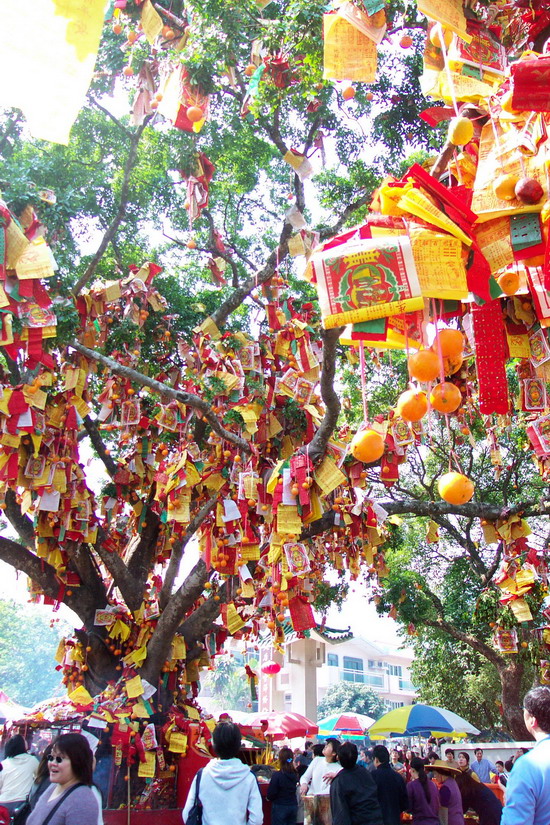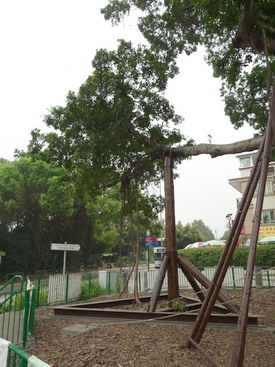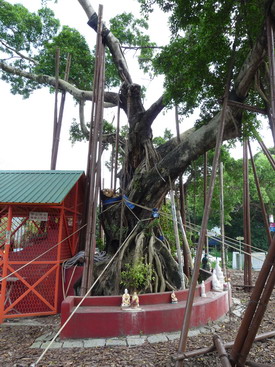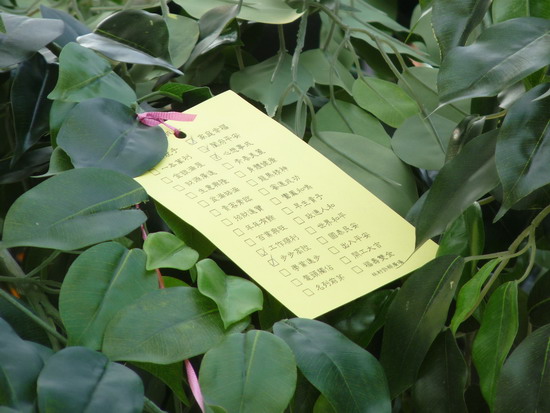|
|
|
|
情景. 許一個願 Scenes - Make a wish |
|
|
自從林村許願樹在2005年新年期間枝條斷裂壓傷人後,當局下令禁絕拋寶牒的行為,改為日式的掛寶牒許願,不惜將傳統文化改變了.遊客的反應是用腳投票
-人數大減!
舊許願樹是一棵細葉榕,寶牒先拋上去再扯下來,將賺錢的工具盡情破壞,採取的是不可持續發展的方法,結果是一個負面教材.許願的傳統最終要等到2010年人造許願樹的出現才將節日的氣氛帶回來. 許願樹事件影響著香港的樹木發展.所有具有歷史文化意義的樹木都重新受到重視,泥土的改善,壞枝的修剪,弱枝的鞏固,變成一個可深究的學問. Since one of the branches of the Lam Tsuen Wishing Tree gave way and injured two people during the Chinese New Year in 2005, the practice of throwing up the joss paper has been banned. (People wrote their wishes on joss paper, tied to an orange and then threw them up to hang on the Wishing Tree. If the paper successfully hung onto the tree branches, wishes would come true.) Instead, a Japanese-style way of making wishes was adopted. (Wooden racks were set up in place for the joss papers to be hung.) The deviation of the traditional culture was voted with the feet of tourists. The number of tourists (or locals) dropped significantly. The Wishing Tree is an old Chinese Banyan (Ficus microcarpa). The joss paper were thrown up and then ripped off. The money-making tool was heartily destroyed. What an unsustainable way of development! The result is such a classic negative example. The wish-making tradition only returned in 2010 when an artificial Wishing tree was installed and brought back all the festiveness. The episode of Wishing Tree affects the tree development in Hong Kong. All trees of historical and cultural significance are re-valued and taken seriously. Soil improvement, pruning of broken branches, fortifying weak branches,… all contribute to a profound branch of knowledge. |
|
 掛滿寶牒的樹冠代表了節日的高興氣氛,不能輕易代替. 掛滿寶牒的樹冠代表了節日的高興氣氛,不能輕易代替.拍攝於2002年,相片提供K.H.Cheung A crown fully covered with lots of joss paper reflects festiveness which cannot be easily replaced. Photo credit to K. H. Cheung in 2002 |
|
 |
 |
|
支撐架,樹枝上的索纜,竹枝導引氣根,拉纜,百寶盡出,也示範著如何對日後的"古樹名木"作出保養. Supporting frame, cable on branches, bamboo canes conducting the growth of aerial roots, …. all kinds of talismans demonstrate how to maintain the 「Old and Valuable trees」 in future. |
|
 新式的許願紙以點心紙形式選擇願望.谷主起初以為"萬事如意"(全選)便是最好的選擇,看真一點,其中"早生貴子"可不是每個人都想要的願望! 新式的許願紙以點心紙形式選擇願望.谷主起初以為"萬事如意"(全選)便是最好的選擇,看真一點,其中"早生貴子"可不是每個人都想要的願望!The new joss paper actually is a form (well, I must say it』s similar to the 「dim sum」 order form when we 「yum-cha」) which you can simply check the boxes of the many options. At first glance, I thought 萬事如意 (pronounced as 「wanshiruyi」 in Putonghua, means all hopes to be fulfilled), i.e. check all the boxes would be the best choice. When I have a better look, then I realize that "早生貴子" (pronounced as 「zaoshengguizi」 in Putonghua, means give birth to a son soon, propitiatory compliments to the newly-weds) may not be a wish for everyone! *translated by Mary Chung |
|
|
作者: Leon Lau, 譯者: Mary Chung facebook群組, s94096507@gmail.com |
|
| 下一篇 板根之王 | |